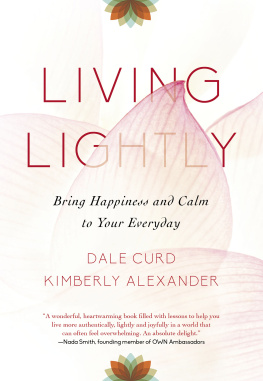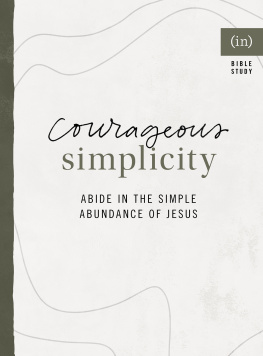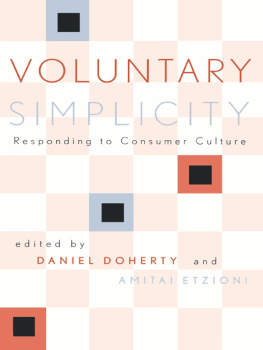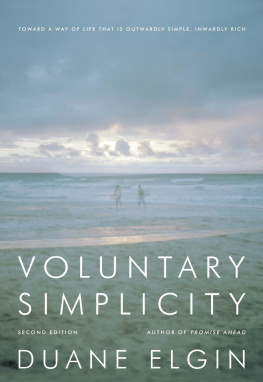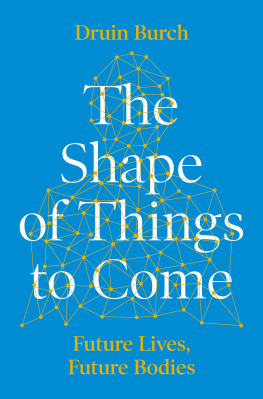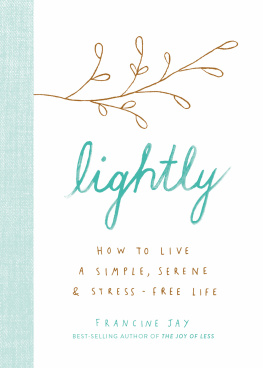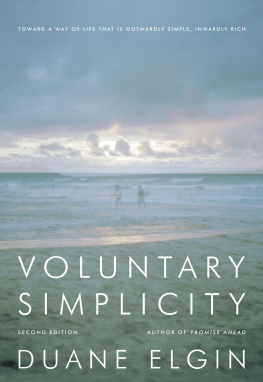Stepping
lightly
Simplicity
for people
and the planet
Mark A. Burch

new catalyst books
CATALOGUING IN PUBLICATION DATA:
A catalog record for this publication is available from the National Library of Canada.
New Catalyst Books edition 2011
Copyright 2000 by Mark A. Burch. All rights reserved.
Cover design by Val Spiedel from a photo by Don Bonsey, Stone Images.
New Society Publishers acknowledges the support of the Government of Canada through the Book Publishing Industry Development Program (BPIDP) for our publishing activities,
Paperback ISBN: 978-1-897408-18-6
Original ISBN: 0-86571-423-1
Inquiries regarding requests to reprint all or part of Stepping Lightly should be addressed to New Catalyst Books at the address below.
To order directly from the publishers, please call toll-free (North America) 1-800-567-6772. Any other inquiries can be directed by mail to:
New Catalyst Books
P.O. Box 189, Gabriola Island, BC V0R 1X0, Canada
1-250-247-9737
New Catalyst Books is an imprint of New Society Publishers, aimed at providing readers with access to a wider range of books dealing with sustainability issues than is usually available through the regular book trade. In keeping with our commitment to publish books with the least possible impact on the environment, all New Catalyst titles are available in paperless, electronic form, as well as in print form on an on-demand basis. New Catalyst Books Sustainability Classics series is specifically designed to keep books in print that have enduring value in the field of sustainability. Please place orders directly through New Catalyst Books at the address above.
For further information, or to browse our full list of books, visit our website at:
www.newcatalystbooks.com

new catalyst books
www.newcatalystbooks.com
For Charlotte
who daily helps me remember
the goodness of simple things,
the value of slowing down, the
warmth of love, and the precious
gift of friendship.
Table of Contents
I would like to express my heart-felt appreciation to Maggie Paquet for her invaluable services in editing this manuscript as well as for her insightful and constructive suggestions on several key arguments in the text. I also appreciate the assistance, support, and encouragement from Christopher and Judith Plant of New Society Publishers in moving the book through all phases of the production process. Finally, I want to acknowledge the support and encouragement of my wife Charlotte, as well as the many questions, challenges, and suggestions offered by my students and friends that contributed in so many ways to my own learning process.

THE CHALLENGE
AND THE JOY
OF VOLUNTARY SIMPLICITY
This book has grown out of a long journey. Its beginnings certainly lie in the 1960s, when I was in full rebellion against what I perceived to be the materialistic values of my parents generation and was surrounded by a very large number of like-minded peers. It was in this time that I fell in love with the idea of simple living, even though there have certainly been seasons in my practice of simplicity including winters when it seemed to sleep under the snows of highly competitive full-time jobs, financial worries, and material aspirations as strong as any that motivated my parents. Nevertheless, whether it slept or whether it was awake and speaking to me, the love of simplicity has been a constant companion as well as a cherished ideal.
Through 30 years I have worked as a psychotherapist helping people make change in their personal lives, and later as an environmental educator trying to help people learn how to live in greater harmony with our planet. Mingled with both has been the conviction that the spiritual depths of human experience have a great deal to say to us, both in our individual journeys of growth and transformation and in our collective human experiment in community with each other and with the Earth. Overshadowing everything has been a pervasive sense that our future hangs by a thread, threatened since 1945 by nuclear annihilation, but more recently by the steady degradation of Earths living systems.
The question that has been my most constant companion over the years is this: How can a person best live in order to be love, to be non-violence, and to be in harmony first with the inner spiritual realm and then with the outer realm of other people and the Earth? What I or others (whether or not of religious or scientific orthodoxy) believe is of less concern to me than that the form life takes is conducive to love and the further blossoming of life.
In 1994, I wrote a small book on voluntary simplicity in which I attempted to address this question as directly and simply as I could. The book was published in 1995 and then, as they say, one thing led to another. I started to workshop the book and developed several courses addressing ways in which the practice of voluntary simplicity might apply to different concerns, such as community well-being, environmental stewardship, spiritual growth, work, personal identity, and self-understanding. Eventually, a university in Canada invited me to develop a course on voluntary simplicity. This offered a further opportunity to explore the many areas of life in which simple living might have something to say to the experience of the millennium just ending, but especially to the millennium just beginning.
The question that has been my most constant companion over the years is this: How can a person best live in order to be love, to be non-violence, and to be in harmony first with the inner spiritual realm and then with the outer realm of other people and the Earth?
One of the best things about teaching a course in something and then having bright young people ask very probing questions about it is that it offers a wonderful opportunity to learn more oneself and to think through the subject in far greater depth. The more pointed the challenges to what simple living has to say, the more convinced I became that it has a very great deal to say not just to our contemporary very muddled, precarious, and almost hopelessly dangerous situation, but to every person of good will in every imaginable situation.
An additional motivation to learn more about the practice of simplicity was the fact that I was laid off from a comfortably remunerative position with a provincial government department in 1995. What up until then had been a potential life option turned into a pressing necessity. At first I lived with considerable anxiety and the belief that I needed to get myself right back into the same way of making a living that I had pursued very successfully for nearly 30 years. But there was another part of me that was healthy enough to be reluctant to reinsert my soul into the meat grinder of late-20th-century paid employment. Some deeper part of me kept calming and reassuring the anxious part and steadily steering a different course in the direction of my love, not in the direction that would at first be recognized as common sense.
Out of pressing necessity, my personal practice of simplicity found new reasons to move forward until it eventually became not a matter of necessity but of daily choice. In developing and teaching the course, I was able to explore the historic foundations of simplicity and its implications. To my delight, Ive discovered that Im not the only one interested in voluntary simplicity. We have a great deal to share and a great deal yet to explore and create. There are a lot of people more knowledgeable and experienced in living this than I am, many of whom will never write a word about it to them I will always defer as my teachers and inspirations. Both my students and my mentors have taught me so much that I have wanted to bring it together somewhere so others can gain access to it. Hence this book.


